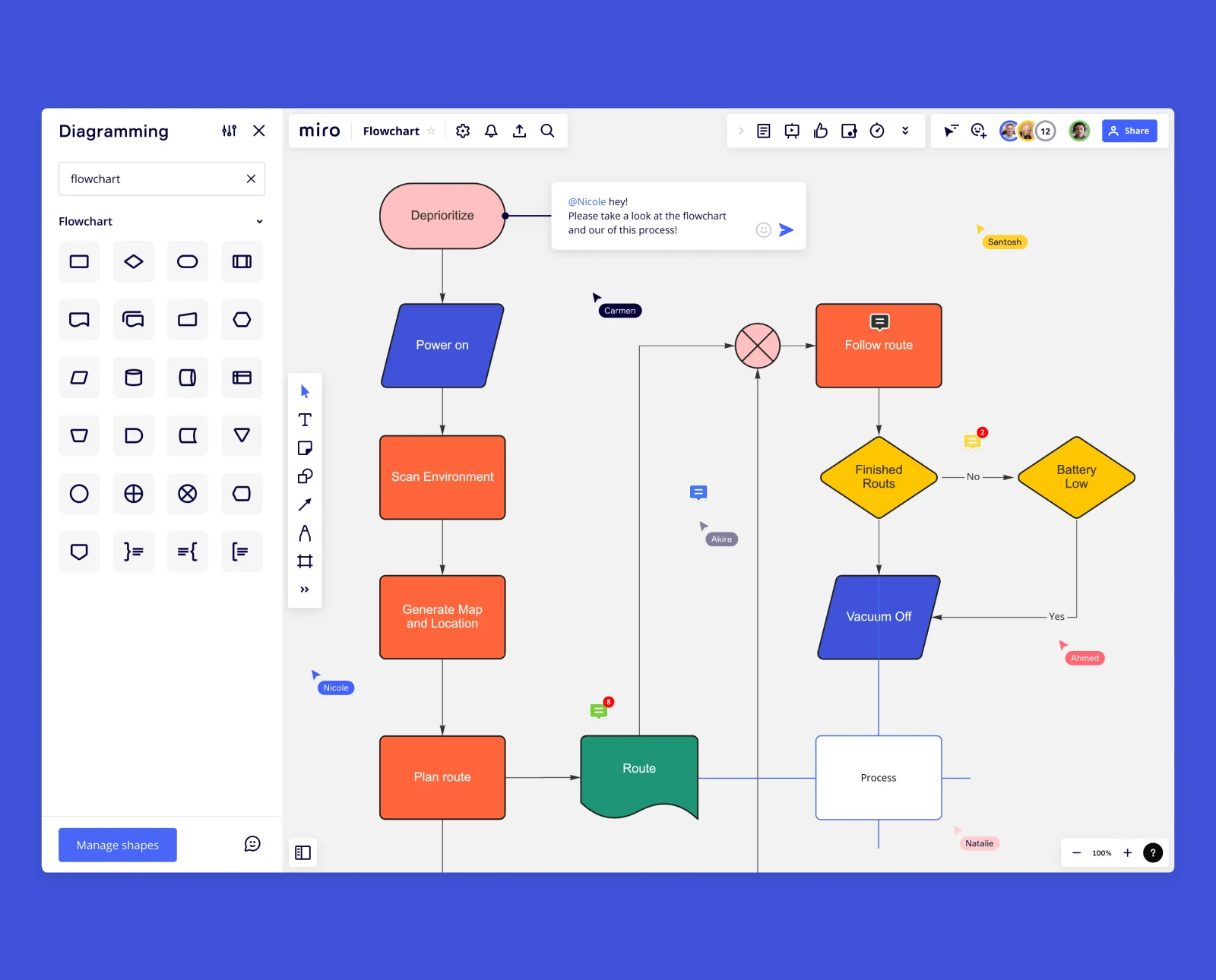
Flowchart Rules for Collaborative Success

Summary
In this guide, you will learn:
- Principles for effective flowcharts
- How to structure flowcharts
- Best practices for symbols and connectors
- Techniques to avoid pitfalls
- Ways to improve communication
- Tips for adapting flowcharts
Try Miro now
Join thousands of teams using Miro to do their best work yet.
Understanding Flowchart Rules
Flowchart rules are the guiding principles that govern the construction and interpretation of flowcharts, streamlining processes and fostering a culture of collaborative success. By employing standardized symbols and conventions, these rules eliminate ambiguity and enable a consistent understanding of complex processes.
With flowchart rules in place, teams can easily visualize the steps and decision points within a process, promoting clarity and enhancing the overall collaborative experience. Discover Miro's wide variety of flowchart templates.
Designing for Clarity and Precision
To maximize the benefits of flowchart rules, careful design is essential. Two critical aspects include:
Standardized Symbols:
Establishing a universal set of flowchart symbols and their meanings ensures a uniform representation of processes across the organization. This standardized approach reduces confusion and allows team members from various departments to interpret flowcharts accurately.
Logical Flow:
Creating a logical sequence of steps within the flowchart helps in presenting processes in a comprehensible manner. A well-structured flowchart with a clear start and endpoint, along with well-defined decision points and branching, contributes to the successful implementation of collaborative efforts.
Integrating Flowchart Rules into Collaborative Workflows
To achieve seamless collaboration, integrating flowchart rules into various workflows is vital. This entails:
Identifying Key Processes:
Recognizing the critical processes that significantly impact business outcomes. Integrating flowchart rules into these key workflows can lead to enhanced productivity and efficiency across the organization.
Collaborative Flowchart Design and Review:
Involving cross-functional teams in the design and review of flowcharts promotes a sense of ownership and accountability. Collaborative efforts in flowcharting ensure that diverse perspectives are considered, ultimately leading to more effective process representation.
Best Practices for Adherence and Adoption
Implementing flowchart rules successfully requires navigating potential challenges and fostering a culture of adherence:
Overcoming Challenges:
Acknowledging and addressing potential hurdles that may arise during the adoption of flowchart rules. Providing adequate training and support to team members ensures a smooth transition and minimizes resistance.
Fostering a Culture of Adherence:
Cultivating a work environment that values and encourages adherence to flowchart rules. Recognizing and celebrating team members' efforts in following flowchart guidelines can further reinforce the importance of collaborative flowcharting.
Monitoring, Measuring, and Improving Flowchart Rules
Maintaining up-to-date and effective flowchart rules is an ongoing process. This involves:
Regular Updates:
Regularly reviewing and updating flowchart rules to reflect any changes in processes, team structures, or industry standards. Keeping flowcharts accurate and relevant is vital for facilitating collaboration and informed decision-making.
Utilizing Data:
Leveraging data-driven insights to analyze the performance of flowchart rules. Metrics and feedback can reveal areas that require improvement, enabling continuous refinement and optimization.
Conclusion
Flowchart rules are the linchpin of collaborative success, empowering teams to work harmoniously towards shared goals. By embracing standardized symbols, logical flowchart design, and a collaborative approach to flowcharting, businesses can unlock the true potential of this powerful tool.
Through continuous monitoring, improvement, and a commitment to adherence, flowchart rules become instrumental in driving efficiency and achieving unparalleled collaborative success.
To create your collaborative flowcharts seamlessly, explore Miro's flowchart maker with its user-friendly interface and real-time collaboration features.
Author: Miro Team
Last update: October 10, 2025